A storied institution climbs down from the ivory tower.

Step onto the Reed College campus in Southeast Portland and it’s easy to understand why some students see a real-life Hogwarts School of Witchcraft and Wizardry.
The campus, located at a remove from the city, features wide lawns, ancient oaks and Gothic-Tudor architecture. The school mascot is a griffin. Its nuclear research reactor — the only one in the nation operated by undergrads — emits a blue Cherenkov glow deep in the wells of its ionized waters. The Crystal Springs bubble up from the depths of Reed Canyon, and more than a few giants have likely been spotted during Reed’s notorious Renn Fayre, a three-day, end-of-the-year celebration noted for its creative anarchy.
“The initial draw to Reed is this feeling that you are being taken somewhere different than any other place you’ve been to before,” says Nick Fiore, a 21-year-old junior who is majoring in math and economics and also reads Latin and Greek. “Rather quickly, it feels like this is where you should be. To call that anything but magical is wrong. It definitely gives off a Hogwarts vibe.”
Reed, which enrolls about 1,400 students, does emanate an old- world — and other-world — sensibility. But make no mistake: The realities of the 21st century are clamoring at the gates. As debate over the value and cost of higher education intensifies, this elite liberal arts institution finds itself in the position of having to defend its relevance and sell itself to outsiders.
That effort crystallizes in the self-consciously named Center for Life Beyond Reed, a resource center that was christened in 2012 and is aimed at connecting students with careers. A new computer science program, scheduled to launch next fall, is similarly pragmatic — a nod to the many Reed graduates who go on to work in the field and the ascendancy of today’s tech-oriented, entrepreneurial economy.
These developments hardly seem groundbreaking. But institutional change doesn’t come easy. Just as the breakup of 20th-century geopolitical systems have exposed internecine rifts, so too the external forces bearing down on Reed reveal internal divisions. Drawing in students, faculty and administrators, the school’s evolution is unfolding as a struggle between those who want to preserve Reed’s status as an epicenter of pure intellectual endeavor and those who want the college to adapt more quickly to mainstream demands.
“We have some very fundamental principles, and we don’t just blow with the wind,” says Nigel Nicholson, the school’s dean of faculty and a classics professor who speaks with a pronounced Oxford-educated British accent. “It’s important to resist the excessive instrumentalization of education. It’s important there is a Reed and that Reed stands for something.”
Mike Brody, vice president and dean of student services, has a more pragmatic perspective. “The days of being able to focus exclusively on education probably ended in the last decade,” he says. “What do students get for their investment? There’s no reason to believe we shouldn’t move them closer to their longterm goals.”
Can Reed retain its magic and remain relevant in today’s world? It’s a modern-day quandary, one that is pertinent not just to the Reed trajectory, but also the future of higher education, public and private.
At some level, Reed has always straddled two worlds. The college was founded in 1908, when the industrial revolution was in full swing. To compete with the rush of land-grant colleges and professional schools, many traditional universities cultivated wealthy students, relaxed academic requirements and promoted collegiate sports.
Bucking the trend, Reed’s founders envisioned an “Ideal College” — a school focused on the pursuit of knowledge with no “side-show amusements” of intercollegiate sports, fraternities, sororities, honors, awards or even grades.
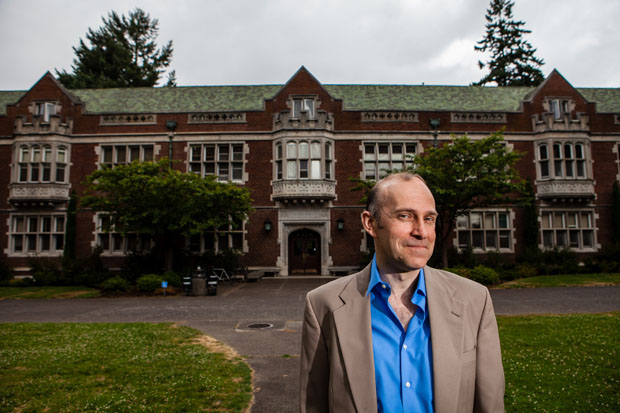
Old guard: Classics professor Nigel Nicholson
Yet as Reed evolved, the school didn’t shy away from economic development — or the C-suite. To outsiders, Reed is perhaps best known for its counterculture, liberal drug use and emphasis on classical education. But if the school sets itself apart from mundane — and modern — concerns, Reed simultaneously claims its brand of intellectual independence is key to driving business innovation. That duality permeates the campus, students say. “Reed sits in this eternal tension,” says Fiore. “You’ve got this very conservative curriculum and progressive student body. It’s that reality that shapes a lot of why Reed is great.”
As tour guides and marketing materials are quick to note, Reed temporarily hosted one of the world’s most successful wizards: Steve Jobs. The late-Apple CEO famously credited the calligraphy course he took at Reed — before dropping out — as an inspiration for the groundbreaking iMac fonts. Reed itself served as a pipeline for Apple employees during Jobs’ tenure.
Since then, hundreds of graduates have gone to work at Microsoft. Reed alum Howard Vollum founded Tektronix; the founders of next generation startups Urban Airship and Puppet Labs, Michael Richardson and Luke Kanies, also claim Reed as their alma mater. “There are tons of Reedies in the tech world,” says president John Kroger, the former Oregon attorney general and Yale philosophy professor who took the reins in 2012. Reed, he says, “has always been in demand in the marketplace.”
But if that’s the case, a powerful trifecta — ubiquitous technology, the Great Recession and a higher-education identity crisis — is pushing the school to develop closer, more formal relationships with the business community and to think more aggressively about how to market itself to students.
It’s a trajectory that began in earnest in 2008. That’s when the housing market crashed and donations to liberal arts colleges, including Reed, began drying up. Moody’s downgraded an average of 28 institutions annually in the five years through 2013, more than double the average in the prior five-year period, though Reed was not among them. One study showed the number of liberal arts colleges declined by 39%.
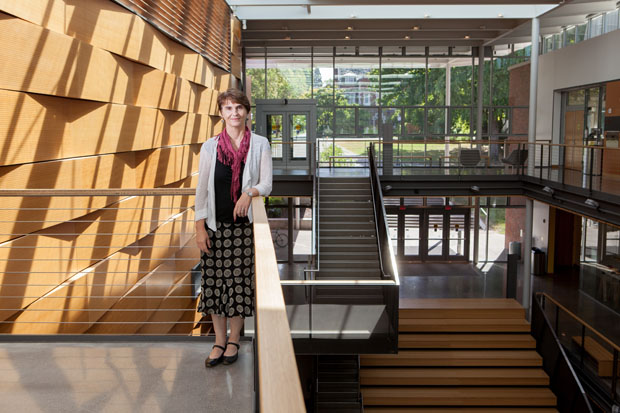
Money talks: Jan Kurtz, director of development, inside Reed’s new performing arts building
Today, many schools are bowing to the pressures of a market-minded world by beefing up business curriculum and launching entrepreneurial initiatives such as technology and business accelerators. The changes are driven largely by cost-conscious and career-minded students — and their parents. According to a 2014 UCLA study of college freshmen, students — for the first time in the survey’s 49-year history — say they value getting a job more than learning about things that interest them.
Reed is paying attention. “Twenty years ago, Reed took the position that people would figure out about Reed through friends and family, so we didn’t need to bother much about communicating our message,” says Kroger. “We don’t take that for granted anymore.”
The school’s expanding computer science program is a case in point. Last year Reed created a “software design studio” for students who were majoring in non-tech disciplines such as classics, music and art but were nevertheless interested in learning how to code. The studio is directed by a technologist in residence — Lennon Day-Reynolds, a former technical advisor at Urban Airship — and focuses on the practical applications of computer programming.
More ambitious is a full-blown computer science major slated to launch in 2016, to include three new professors. “Computer science is one of our top priorities,” says Jan Kurtz, Reed’s buttoned-up director of development. (Reed currently offers an emphasis, not a major, in computer science.)
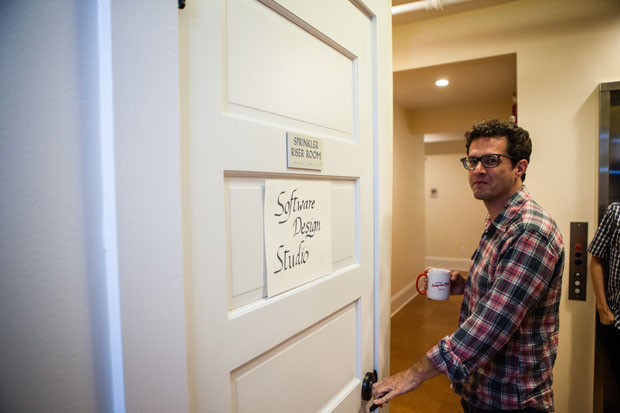
Hands-on learning: Computer science professor Jim Fix
Jim Fix, an associate professor of computer science, says he eventually envisions partnering with Portland’s tech community, although he “bristles a little” at the notion that Reed is entering a new market. “For years we’ve placed people in the tech world without technical training,” says Fix, who wears dark jeans, a plaid shirt and nerd-cool horned-rim glasses. “Now we recognize that we can provide a formal education and experience for students.”
Fix says he came to Reed in 1999 because of a graduate he met at Oracle. “He had a longer vision and a broader sense for what he was doing. I found that striking.”
Today, taking a long view of education at Reed is as much about career as intellectual expansiveness. Consider the Center for Life Beyond Reed. In July, Beyond Reed, whose clunky name suggests a certain cognitive dissonance about its purpose, hired a new director/associate dean of students: Alice Harra, a onetime recruiter for higher-education publishers and the former director of Northwestern University’s career services division. She is eager to talk about connecting student researchers with like-minded businesses — for profit, nonprofit and “for purpose” — through internships, externships and other partnerships.
| Political science professor Paul Gronke caused a minor uproar when he started teaching at Reed 15 years ago — by telling students it was okay to want to make money. “I took a lot of flak my first five years here, and it didn’t help I used the word ‘God’ in the classroom,” Gronke says. |
“How can we help take what lights up a student academically into the business community?” Harra asks. Beyond Reed, she says, “is an intentionality for making connections.” Reed needs to do a better job making those connections at all levels of the college experience, says Kroger, who is widely viewed as the architect of the school’s market-oriented developments.
“In the past, we worried that if you talked about future careers with Reed students, it would take away from the intellectual and academic focus,” he says. “That has changed over the last decade. There’s a growing awareness in the Reed community driven by alumni that there isn’t a conflict about being intellectual and thinking about your future.”
That kind of thinking seems relatively innocuous. But for many members of the campus community, it’s a slippery slope. Practical training has a place at Reed, acknowledges Nicholson — in a not-that-there’s-anything-wrong-with-that way. “But we need to resist the idea that education is simply measured by the job you get. We believe we’re training students for life — not for their first job.”
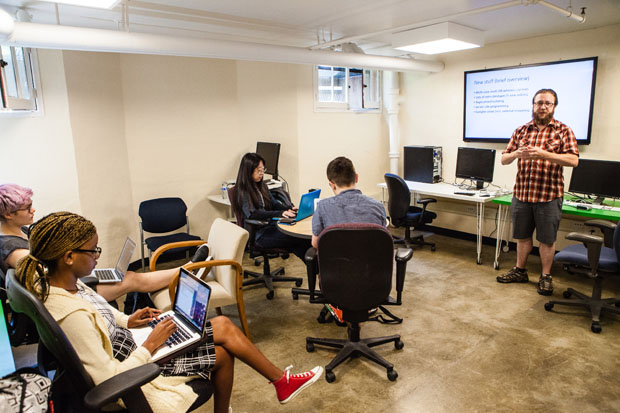
Back to school: Technologist in residence Lennon Day-Reynolds, former director of engineering at Urban Airship
Nicholson belongs to the “old guard,” a self-described group of alumni and faculty who espouse traditional Reed values and are concerned the school is becoming too business oriented. Another member is Darius Rejali, a political science professor and internationally renowned torture expert who worries Reed may be suffering from corporatization and the loss of an authentic and creative spirit. The Iranian-born Rejali, who stopped attending the Burning Man festival for the same reasons, says he misses the “good old days” when Reed was the kind of place where a student once hung a large silver fork around her neck and requested to be called “Fork” thereafter. Or a guy who shaved half of his face and let a beard grow on the other half to show support for old-growth forests.
It’s easy to dismiss these reminiscences as nostalgia for a bygone way of living, in and outside the academy. But nostalgia sells, especially to alumni. And one challenge for Reed going forward is that many old-guard donors object to the school’s more vocational initiatives. “We don’t have donors saying, ‘You need to be different,’” says Kurtz. “They’re saying, ‘The world needs Reed. And be more like Reed.’”
In 2013 Kroger triggered a mini alumni revolt, including the resignation of a longtime board member, when the Reed president axed “Put That in Your Pipe and Smoke It” and “Adroit Anticipation of Awesome Altered Adventures 201.” Both classes were part of a Reed tradition called Paideia that allows students, staff or alumni to offer free, noncredit courses on any topic.
In another instance, Reed graduate Laura Graser, a lawyer who graduated in 1969, decided to put her college donations into a separate account to be released to the school only after Kroger leaves. Kroger, Graser says, “just doesn’t get Reed.”
Despite these challenges, Reed fundraising, a marker of strategic success, is on the upswing. It wasn’t always that way. For decades Reed existed in relative poverty. In 1971 its endowment was only $4 million. Reed was also known as an outlier, famously dropping out of U.S. News & World Report’s annual college rankings in 1995, because the magazine’s system was “hopelessly flawed.”
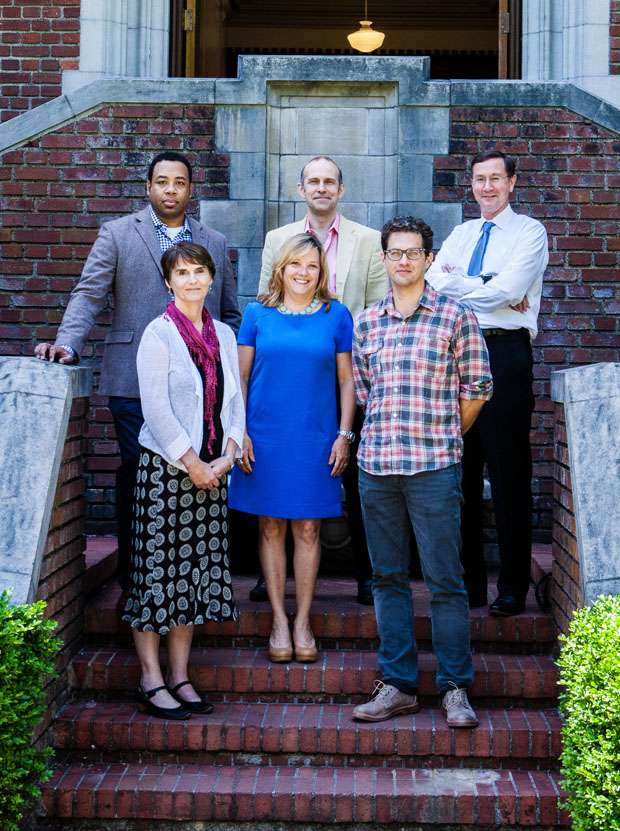
Class photo: Clockwise, from top left — Dean of Admissions Milyon Trulove, Nigel Nicholson, John Kroger, Jim Fix, Alice Harra, Jan Kurtz
But even as it dropped out, Reed was tuning in, at least financially. The school’s endowment ballooned from $15 million in the 1980s to $456 million by 2007, thanks in part to the use of alternative investments other colleges weren’t yet using, according to an official Reed history.
Then the housing market crashed. In 2009 Reed’s endowment fell to $329 million, and as the economy recovered, administrative leaders decided Reed needed a more robust marketing and development strategy. In 2011 Reed went on the offensive, leveraging the school’s centennial as the occasion for a $200 million fund drive. The gamble paid off. A “respectable” 30% of the money came from alumni rather than the “meager” contributions of the past, a college report states.
Today fundraising is breaking records, says Kroger, although he admits Reed alumni contribute less than other liberal arts schools. He says that’s partially a reality of West Coast versus East Coast traditions and partially a vestige of the school’s history of being “ambivalent about fundraising.” But that ambivalence is turning into approbation, Kroger says. “We’re moving in an era where, for a college like Reed, more of the education we offer will be financed by philanthropy than tuition. And Reedies are stepping up to help finance the next generation.”
According to Kurtz, the school’s $540 million endowment is the largest in its history. There are other signs of reinvigorated financial relationships. Unlike other universities, Reed has not been “deeply woven into the Oregon or Portland fabric,” says Ryan Deckert, president of the Oregon Business Association. “Other university presidents could walk into most gatherings of business leaders in Oregon and be on a ‘How’s your daughter’s soccer team doing basis?’” he says. The Reed executive team hasn’t been part of that network. Under Kroger’s leadership, Deckert says, that is beginning to change.
At its core, the changes taking place at Reed are designed to win the hearts and minds of students — and the dollars they bring with them. Measured by enrollment, Reed appears to be winning that battle. The college received a record 5,395 applications for about 400 slots this year, compared to 3,956 in 2014.
Numbers notwithstanding, many students seem ready for the “Reed bubble” to pop. “There’s a feeling or pressure at Reed that all your work you’re doing is because you’re going to go to a graduate program someday and be a successful Ph.D. student,” says Fiore, the math and economics major. “That message lurks in faculty bodies. But people aren’t brains in vats. We need a whole set of tools to support them. Career services should not only be putting you in touch with alumni, but also asking when you’re a freshman and sophomore, ‘What sorts of things are you involved in that are not academic?’”
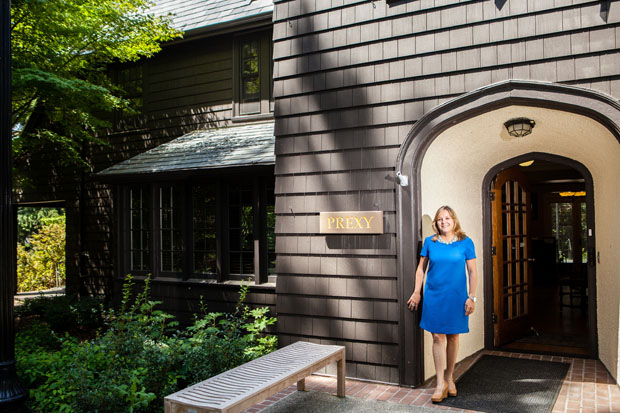
“How can we take what lights up a student academically into the business community.” — Alice Harra
Frankie Breedlove, a 19-year-old sociology major, is attending Reed on scholarship. But “the price tag is just huge,” says the rising junior and Reed Honor Council member. “I got a generous grant, but even so, debt is a real issue for me and all college-age kids.” Tuition and fees at Reed increased from $49,950 in 2009-10 to $59,960 in 2014-15. The average financial aid package is $44,147.
Exorbitant college costs, of course, are the single most important factor driving change in higher education. Students aren’t the only stakeholders questioning the expense. The cost of a liberal arts degree like Reed’s is “laughable,” says Ryan Carson, the CEO of Treehouse, a Portland-based online coding school. “It’s strange we have let ourselves be okay with this,” Carson says. “If a person can afford to go to a liberal arts school without going into debt, that’s great. If you have to take out any student loans to go, it’s a total mistake because there’s no job connected to it at the end.”
Treehouse isn’t a lone voice in the wilderness. On the contrary, it is one of many trade schools and education technology companies — call them Death Eaters, call them disruptors — encroaching on liberal arts colleges and public universities alike. These education models offer a compelling if yet-to-be-proven value proposition, promising to educate students and place them in jobs at the fraction of the cost of a four-year college. Treehouse, Carson claims, can place students in jobs that start at $45,000 a year after just six to 12 months.
In the Reed community, a new guard of business-minded alumni is also pushing, albeit with mixed feelings, for systemic change. “Education and funding of education is entirely, embarrassingly broken,” says Luke Kanies, the Puppet Labs CEO who attended Reed on scholarship after maxing out his student loans. “It’s hard to say this one college has a slightly less shameful system than another. The fact that education costs are racing with health care costs is just ridiculous.”
In the next breath, Kanies expresses concern about Reed losing its single-minded purpose. “Our country is on a fast descent against intellectualism,” says the 40-year-old Kanies, who showed up at Reed 19 years ago sporting a Mohawk, knee-high combat boots and a spiked leather jacket. “Critical thinking and using your brain is a crime. To have a school like Reed that crushes you under the need to think critically, that crushes you under the need to think intellectually — that’s fantastic.”
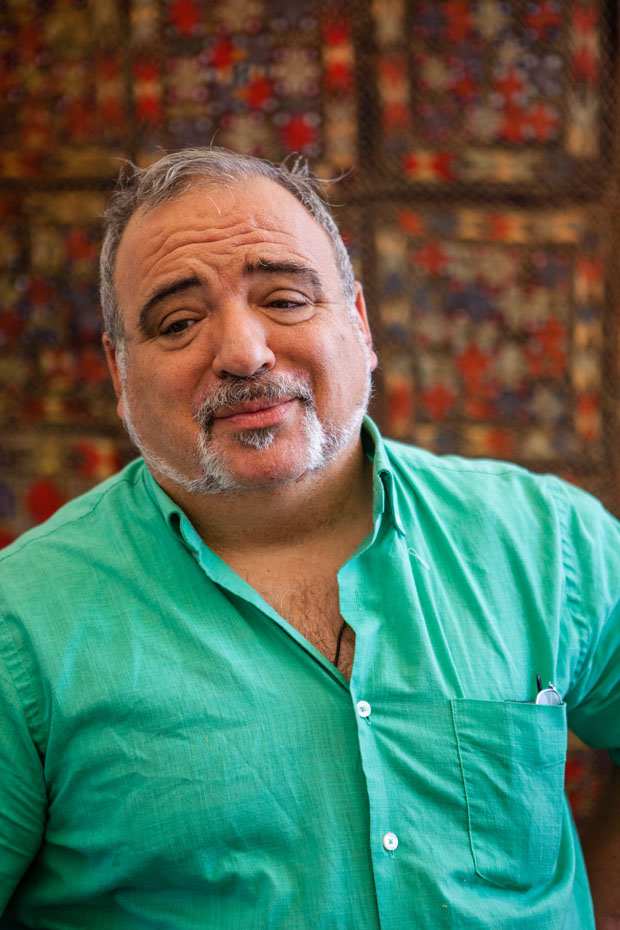 |
Are universities, centers for creative and intellectual endeavor, devolving into networking institutions for the wealthy? Is higher education becoming a proxy for job training? What drives innovation? Analytical inquiry or skill acquisition?
These questions form the crux of the debates taking place around the country: in the halls of public universities, the corridors of state legislatures and the ivy-covered brick buildings of liberal arts colleges. Reed distills the essence of those debates and, perhaps, their resolution. “We need a matchmaker,” says Kambiz Ghanea. Bassiri, a celebrated professor of religion and humanities, “someone who is integrated into the business community who can make those connections.”
Kanies takes the long view. “It’s become clear that the things that meant success over the last 100 years aren’t necessarily the things that will lead to success in the next 100 years,” he says. He poses a question he is asking about his own fast-growing company, Puppet Labs: “How do you transition into maturity without losing what made you great?”
Reed has never been as disconnected from real life as some of its supporters and critics like to claim. Still, the image Kanies conjures up is ironic: Reed as entrepreneurial case study. Gone is the Hogwarts-esque magical world. In its place is a startup, struggling to maintain the enormously successful culture and organization its employees and customers worked so hard to establish.




